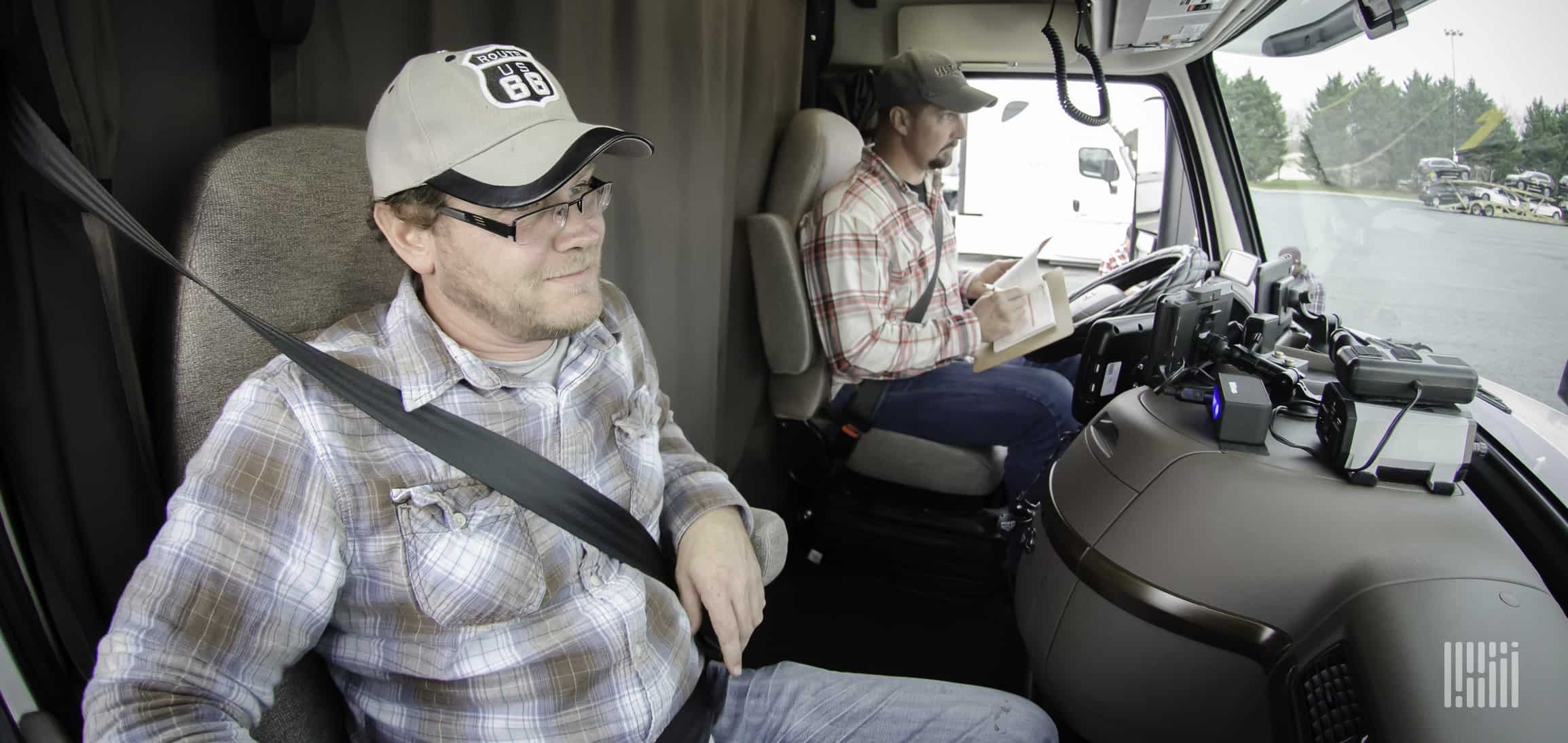If you operate within the trucking industry, it is crucial to be aware of the ELD mandate and its exemptions.
Electronic logging devices for trucks (ELDs) have revolutionized the trucking industry by replacing manual paper logs. They’re also mandatory for most trucks on American roads.
In this article, we’ll delve into what an electronic logbook for truckers is, the ELD mandate and its exceptions. This will help you determine whether your vehicles fall under the ELD rule, and if not, which exemptions apply. So read on to keep your fleet compliant!
And when you’re finished, check out the other articles in our ‘All about ELDs’ series:
- What is the ELD Mandate?
- What happens if you unplug your ELD?
- ELD exemptions: What you need to know
- 6 best trucker ELD providers
What is an ELD?
What does ELD mean?
As mentioned above, ELD stands for electronic logging device. It connects to a vehicle’s engine and records the driver’s hours of service (HOS) electronically.
ELDs are designed to replace pen-and-paper logs in which drivers used to record their HOS. They automatically record driving times, engine hours, miles driven and locations. The information is easily accessed and reviewed digitally by drivers, law enforcement officials, and motor carrier safety auditors.
The use of ELDs has been mandated by the U.S. Federal Motor Carrier Safety Administration (FMCSA) for most commercial motor vehicle drivers. The mandate is aimed at improving safety on the nation’s highways by reducing the risk of driver fatigue.
What is the ELD mandate?
The ELD mandate is a federal regulation requiring commercial drivers to electronically record their HOS instead of using paper logs.
Electronic driver logs aims to:
- Improve driver safety
- Reduce the risk of accidents caused by driver fatigue
- Help enforce regulations related to hours of service
The elog mandate took effect on Dec. 18, 2017, and applies to most truck drivers operating in the U.S.
What are the ELD exemptions?
While most commercial motor vehicle drivers are required to comply with ELD regulations, here are examples of exemptions:
- Drivers who use paper records of duty status (RODS) for eight days or fewer during any 30-day period
- Drivers who don’t operate beyond a 150-air-mile radius of their normal work location
- Drivers of vehicles that were manufactured before the model year 2000
- Drivers who conduct drive-away-tow-away operations, where the vehicle being driven is the commodity being delivered
- Drivers who operate as part of a drive-away operation that involves the delivery of a motor home or a recreational vehicle trailer to a dealership or a customer
- Drivers who conduct driveaway-towaway operations for the delivery of new and used vehicles
- Drivers who work exclusively as harvest or agricultural transporters
You should know that even drivers who are exempt from the ELD mandate or drive ELD exempt trucks must comply with HOS regulations. Instead of having to use an ELD, they’re required to keep accurate paper records of their driving hours.
For more details about federal exemption qualifications, visit the FMCSA website. Additionally, some states may have their own ELD requirements, so drivers should check with their state’s department of transportation to ensure compliance with all regulations.
Can you run a truck without an ELD?
According to the FMCSA, vehicles that are required by law to have a truck ELD can’t be operated without one.
However, like so many things in life, there are a few exceptions to elog rules. That’s why it’s important to understand ELD mandate exemptions and whether you qualify for them.
Can truckers still use paper logs?
Since the implementation of the ELD mandate, many trucking companies have adopted electronic logs for truckers to record drivers’ duty statuses.
According to the Department of Transportation, “A driver should only use paper logs, electronic logging software, or other electronic means to record their hours of service if the ELD malfunction hinders the accurate recording of the driver’s hours of service data.”
Truckers should consult with regulatory authorities for the latest exemptions and requirements regarding maintaining electronic or paper logs.
Be aware of all ELD mandates
There are some very solid reasons why it’s important to know about the ELD mandates for truckers:
- Compliance: What is ELD compliance? The ELD mandate requires truck drivers to have an ELD installed in their vehicles to record their hours of service. Knowing about the mandate and complying with it is crucial for truckers to avoid penalties and fines.
- Safety: The ELD driver mandate is designed to improve road safety by preventing drivers from working excessive hours. Adhering to it can help avoid fatigue-related accidents.
- Efficiency: ELDs can help trucking companies and drivers become more efficient by providing accurate, real-time driving and route data. Knowing about the mandate and using ELDs can improve operations and reduce costs.
- Competitive advantage: Companies that comply with the ELD mandate may have a competitive advantage over those that do not. Customers may prefer to work with companies that prioritize safety and compliance.
- Industry changes: The ELD mandate is just one of many regulations and changes affecting the trucking industry. Knowing about these changes can help truckers stay informed and adapt to new rules and requirements.
ELD goals and exemptions
The primary goal of the ELD mandate is to improve safety on the road. By helping to ensure that drivers are adequately rested, ELDs reduce the number of accidents caused by fatigue. For further info, you can read our article, Are ELDs making the trucking industry safer?
Although HOS regulations apply to all truck drivers, in some cases you may not be obligated to install an ELD. By understanding whether elog exemptions apply to you, you can avoid costly fines and penalties that may disrupt your operations.
FAQ
ELD exempt refers to vehicles or drivers that are not required to comply with the electronic logging device (ELD) mandate. As per the Federal Motor Carrier Safety Administration regulations, certain types of vehicles or drivers qualify for ELD exceptions.
Some trucks with FMCSA ELD exemptions include: Trucks manufactured prior to model year 2000, short-haul vehicles, driveaway-towaway operations and agricultural trucks. Always consult the FMCSA website for the latest regulations.
The ELD exemption allows drivers to continue using paper logs or timecards to record their HOS rather than the electronic logging device. This exemption is provided to reduce the regulatory burden on certain drivers, particularly those who operate smaller fleets or possess older vehicles without the technological requirements to connect with an ELD.


